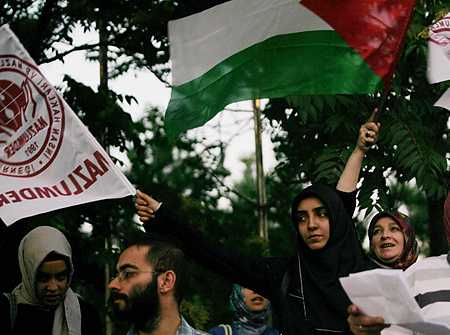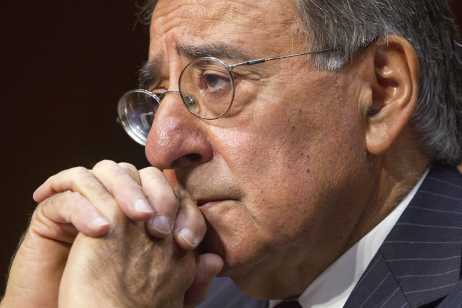
JERUSALEM // Israel has become isolated in the region and too reluctant to compromise with the Palestinians, the top US defence official has warned in a rare public rebuke of Israel.
The US defence secretary, Leon Panetta, criticised Israel’s response to the Arab Spring uprisings, saying it was damaging the country’s ties with Egypt and Turkey and undermining prospects for peace with the Palestinians.
He also cautioned Israel against taking hasty military action against Iran’s alleged nuclear weapons facilities.
Speaking on Friday at the Washington-based Brookings Institution, a think tank, Mr Panetta called on the government of Israel’s prime minister, Benjamin Netanyahu, to “get to the damned table” and resume negotiating with the Palestinians.
“I understand the view that this is not the time to pursue peace, and that the Arab awakening further imperils the dream of a safe and secure Jewish and democratic Israel,” he said. “But I disagree with that view.”
His remarks, although unusually firm for a US official, come amid reports of rising frustration in Washington with Israel and the policies of its right-wing, pro-settlement government. Mr Panetta took a similar line in October during his first visit to Israel as defence secretary and some analysts see his words as coming straight from the White House and the president, Barack Obama.
“He’s very influential in the White House,” said Yaron Ezrahi, a professor of political science at Hebrew University in Jerusalem.
“I think the fact that he said this is not necessarily because Obama can’t say it, but because it’s something coming from the defence establishment in the US: it’s the head of America’s security and policy-making establishment flatly saying that Netanyahu’s policies are sabotaging America’s interests in the region. It’s as simple as that.”
Mr Panetta is the latest senior US official to talk tough on Israel, a delicate balancing act given the Israeli lobby’s powerful influence in Washington.
Mr Panetta’s predecessor, Robert Gates, who retired over the summer, was reported in September to have called Mr Netanyahu an “ungrateful ally” after the Israeli leader appeared to upbraid Mr Obama during a White House meeting in May.
Last month, Mr Obama described Mr Netanyahu as difficult to work with in remarks to French President Nikolas Sarkozy that were supposed to be private but which were accidentally picked up by microphones and heard by reporters.
US frustration also stems from Israel’s refusal to halt provocative, and repeatedly announced, plans to expand its Jewish settlements in occupied Palestinian territory.
Mr Netanyahu’s failure to halt settlements construction – a key demand of the Palestinian Authority president, Mahmoud Abbas – ultimately scuttled last year’s brief resumption of direct Israel-Palestinian negotiations.
The two sides have since been unable to reconcile their differences and return to direct talks, even as Mr Abbas appears to have placed his United Nations statehood-recognition bid, which Israel and Washington oppose, on hold for the moment.
That gesture has failed to impress Mr Netanyahu, who reportedly rejected proposals on negotiating borders and security arrangements offered by Palestinian officials last month.
The Israeli daily Haaretz reported on Thursday Mr Netanyahu declined to offer the Palestinians a counterproposal – as requested by the Middle East Quartet, the US, EU, Russia and the UN – citing his preference for doing so in direct talks.
Mr Panetta said the “problem right now is we can’t get them to the damn table, to at least sit down and begin to discuss their differences”.
He also urged Israel to “reach out and mend fences” with Egypt and Turkey because of their shared interest in regional stability.
“I believe security is dependent on a strong military but it is also dependent on strong diplomacy,” he said. “And unfortunately, over the past year, we’ve seen Israel’s isolation from its traditional security partners in the region grow.”
Relations with Istanbul and Cairo, once pillars of Israel’s regional policy, have been seriously undermined recently.
Ties with Turkey sank after a deadly Israeli raid last year on a Gaza-bound aid flotilla in which eight Turkish citizens and one Turkish-American activist were killed.
“It is in Israel’s interest, Turkey’s interest, and US interest for Israel to reconcile with Turkey, and both Turkey and Israel need to do more to put their relationship back on track,” Mr Panetta said.
Israeli leaders have sounded growing alarm since Egypt’s Hosni Mubarak was driven from power in February. A cross-border raid into Egypt in August, in which Israeli forces were chasing Islamic militants, killed five Egyptian security officers and inflamed anti-Israel sentiments.
Egypt is one of two Arab countries that maintain a peace treaty with Israel. Jordan is the other.
Mr Panetta also cautioned Israel against taking military action to thwart Iran’s purported plans to build nuclear weapons, saying that international diplomatic efforts, including sanctions, were yielding success.
He emphasised a military response would have to be a “last resort” and said that even if Israel attacks Iran’s nuclear facilities, “at best” this would delay its nuclear ambitions by two years.
A report released last month by the UN’s nuclear watchdog claims Tehran appears to have drawn up designs for a bomb and conducted clandestine research. Iran denies its nuclear activities are intended to produce weapons.
Regardless, Mr Panetta warned, an attack on Iran could have disastrous global ramifications “that would not only involve many lives, but I think could consume the Middle East in confrontation and conflict that we would regret”.

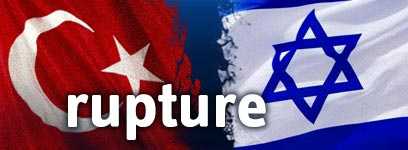
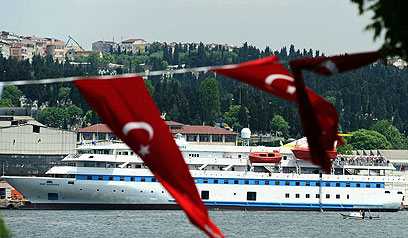
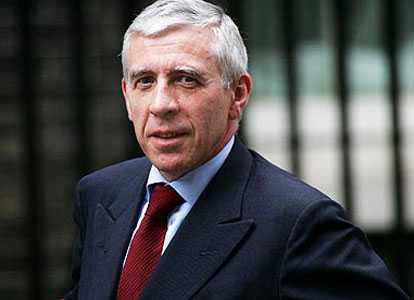
 Israel should have apologized to Turkey for its deadly raid on the Mavi Marmara aid ship, but instead allowed relations to deteriorate, according to United Kingdom’s former Foreign Secretary Jack Straw.
Israel should have apologized to Turkey for its deadly raid on the Mavi Marmara aid ship, but instead allowed relations to deteriorate, according to United Kingdom’s former Foreign Secretary Jack Straw.
